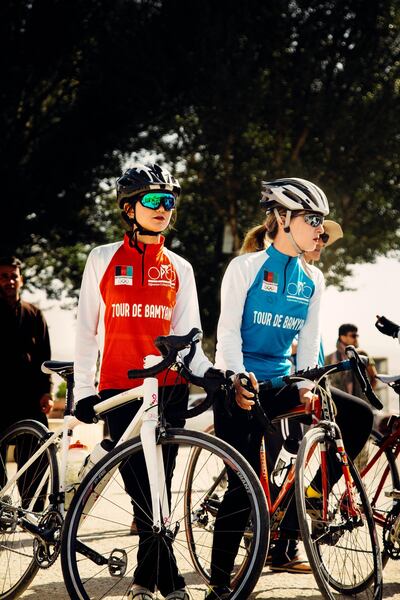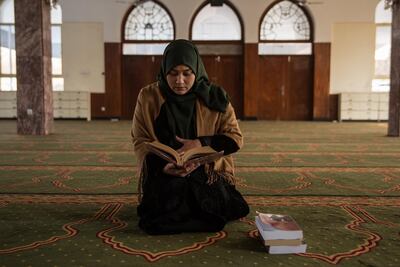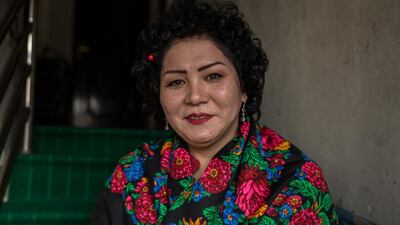Shekiba Aryan pushes her feet deep into the pedals of her bike, the tyres rhythmically humming as she speeds down the asphalt road in her home town Bamyan, her dark hair pulled back tightly into a ponytail under her helmet.
She is only 18, meaning she did not live through the Taliban’s rule in her native Afghanistan.
Laila Haideri, a curly-haired 41-year-old, was not that lucky. She grew up during the militants’ reign, but years later would become the first woman in Kabul to independently open a restaurant.
The profits funded a drug shelter that has so far helped more than 5,000 people – most of them men – overcome addiction.
Both wonder how their lives will be under a potential merger of the Afghan government and the Taliban as direct talks between the two are set to start and negotiators head to Doha.
Women are concerned whether the hard-won freedoms they have pushed for will continue under such a regime.
“If the Taliban comes back, the situation for women might become more difficult. We might not even be allowed to go outside to do sports,” Ms Aryan said.

Although much of Afghan society has loosened the rules applied to women since the Taliban days, they still do not enjoy the same freedoms as men. They live under men, often spoken over rather than supported.
While some men in society preach gender equality, action rarely follows.
“Being a woman is 100 per cent more difficult here,” Ms Haideri said.
“It’s a male-dominated society, not just in Taliban territory, and regardless of whether there is war or peace.”
In the cities, residents have slowly become accustomed to seeing women, for example, take up leadership positions, while in rural areas women continue to receive little public exposure.
A recent report by the International Crisis Group said the Taliban has struggled to address the cultural gap between conservative, rural communities, where they find most of their recruits, and cities, where women and minorities have enjoyed significant freedoms since 2001.
But even in the capital Kabul, Ms Haideri says she is subject to belittlement by men, verbal abuse and harassment. Yet her spirit – and that of so many other women – remains unshaken.
“Men have not been enablers in my life, they are the stumbling stones,” she said.
In February, the US and the Taliban signed a deal towards peace, declaring that US troops would gradually leave the country and that the Taliban would start direct discussions with the Afghan government, which the group does not recognise as legitimate.
Talks were due to start in March, but have been delayed because of a lengthy process of prisoner exchanges on both sides. This week, US National Security Adviser Robert O’Brien spoke to Afghan President Ashraf Ghani, calling for efforts to ensure there are no further delays.
The Afghan government has insisted that a future peace agreement must protect the rights of all citizens, especially women, but many wonder how this might translate into everyday life.
Women face obstacles in many forms – the male literacy rate stands at 55 per cent, for example, but only about 30 per cent of Afghan women can read.
According to the United Nations, one in three girls is married off before the age of 18.
Even “modern” men may marry several wives or are routinely unfaithful, yet demand full commitment from their spouse in return.
The addition of a mother’s name to her child’s identity card was only approved by cabinet this week, a right that fathers and even grandfathers already received.
Only five women were included in the government’s 21-person delegation at the peace talks, while the Taliban only sent men.

The struggle for women’s rights in Afghanistan predates the almost two-decades-long conflict that has raged since the US invasion in 2001, and is entangled with differing ideas about Afghan identity, said Patricia Gossman, Associate Asia director for Human Rights Watch.
“Even in post-2001 Afghanistan, it took massive donor pressure to overcome resistance to the idea that the constitution should guarantee women’s equality,” she said.
“There seems to be a collective amnesia about mass rapes […] in the early 1990s, about restrictions on women’s rights and attacks on women’s education programmes in the refugee camps. Some of the same people in powerful positions now were behind those and, under the Taliban, restrictions on women’s rights expanded dramatically.”
According to the ICG, the Taliban do not intend now to reimpose strict regulations including a “prohibition on women venturing outside without being sufficiently covered, or without a male relative escort, on pain of arrest”. They said that the group is well aware that donors, especially from the West, could withdraw post-peace funding if rules are too harsh.
“Many negative things within the Taliban definitely need reforming,” an official of the militant group said under condition of anonymity.
People remain sceptical, however, about the strength of the commitment to change, especially as high profile women such as Fawzia Koofi, who is on the peace negotiation team, have been targeted with attempted assassinations.
“If there are talks about a peaceful, prosperous situation in our country, no one can exclude women from it,” she said. “We have to be vocal and strict when it comes to preserving the rights of women.”
Like Ms Koofi, Zainab Muwahid, 34, an Islamic scholar who travelled to Doha in 2019 to meet the Taliban, has also clashed with the militants in the past.
“I told them they kill women and children. I said it is not Islamic, but they think they know best,” she said.
“Women are leaders and mothers.”
Speaking in a quiet mosque in Kabul, where she often studies as busy traffic passes by outside, she said she remains fearful of what may come.
Despite all this, Ms Aryan, who recently joined the women’s national cycling team, has hopes for the future.
“If the government and the Taliban come to an agreement, there will be no more war and no more explosions. Innocent people will no longer be killed and children will not be orphaned,” she said.

